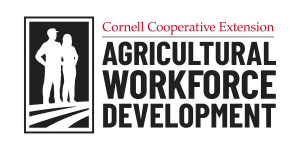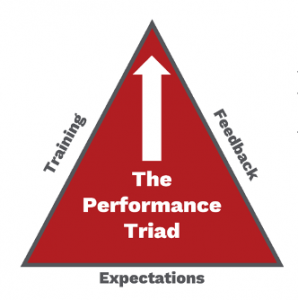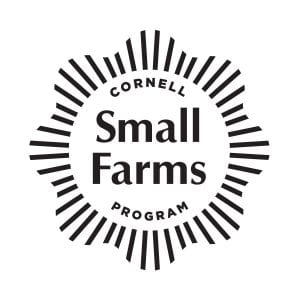The science about wearing face coverings/masks to reduce the spread of novel coronavirus is increasingly clear; wearing a mask dramatically reduces the amount and range of virus particles that  an infected person emits into the air to potentially infect other people. Wearing a mask to protect our family, co-workers, and community seems like a small individual sacrifice considering COVID-19 has already killed over 127,000 Americans. Farm employers need to know that both federal and state authorities recommend face coverings in the workplace in addition to social distancing (keeping at least 6 feet apart). At the federal level CDC Guidance for agriculture contains a whole section on wearing face coverings. New York’s Interim Guidance for Prevention and Response of COVID-19 at Farms contains clear directives at the top of page 2 requiring face coverings.
an infected person emits into the air to potentially infect other people. Wearing a mask to protect our family, co-workers, and community seems like a small individual sacrifice considering COVID-19 has already killed over 127,000 Americans. Farm employers need to know that both federal and state authorities recommend face coverings in the workplace in addition to social distancing (keeping at least 6 feet apart). At the federal level CDC Guidance for agriculture contains a whole section on wearing face coverings. New York’s Interim Guidance for Prevention and Response of COVID-19 at Farms contains clear directives at the top of page 2 requiring face coverings.
EEOC Guidance
Farm employers, working closely with government and Extension, have put new procedures in place to provide face coverings at work and require their use. Unfortunately, there are some farm employees who, for whatever reason, refuse to wear face coverings. Employers have asked: “Can I require an employee to wear a face covering/mask at work?” Fortunately, the U.S. Equal Employment Opportunity Commission (EEOC) answered this question, see quote below and full details here: https://www.eeoc.gov/laws/guidance/pandemic-preparedness-workplace-and-americans-disabilities-act.
12. During a pandemic, may an employer require its employees to wear personal protective equipment (e.g., face masks, gloves, or gowns) designed to reduce the transmission of pandemic infection?
Yes. An employer may require employees to wear personal protective equipment during a pandemic. However, where an employee with a disability needs a related reasonable accommodation under the ADA (e.g., non-latex gloves, or gowns designed for individuals who use wheelchairs), the employer should provide these, absent undue hardship.
Note the second half of the answer mentions “reasonable accommodation” for an employee with a disability. Reasonable accommodation is a legal term under the Americans with Disabilities Act (ADA) that requires employees to make modifications or adjustments to a job to meet the needs of an employee with a disability, within reason. For example, an employee with asthma or other breathing issues might have a legitimate problem with wearing a mask, an employer’s reasonable accommodation for that employee might be to limit him or her to only job activities that can be completed outside in the open air and further than 6 feet from other employees. If the person’s job is a milker, which requires working indoors and closer than 6 feet to other people, then the employer might not be able to make a reasonable accommodation for the employee unless other work can be found.
Employer Best Practices
Farm employers need to make mask wearing a policy for every employee (your business safety plan might be a good place for this) and be clear about when it is required. For example, anytime two or more employees are together indoors or anytime employees are within 6 feet of each other outside. The policy should apply equally to all employees and be enforced consistently and without bias. Importantly, all farm owners and managers must diligently follow the face covering policy themselves in order to lead with the right example and to establish the right culture in the workplace. Similarly, employers should train employees about why the farm has a face covering policy and why it is important to protect the health of everyone. See these multilingual resources: CDC, New York, Cornell, and this farm-focused COVID-19 Video in Spanish (English subtitles)
If an employee still fails or refuses to wear face coverings appropriately, then the employer would have to use discipline. Discipline should start with a calm, verbal conversation between the employee and the supervisor: describe the employee’s behavior, describe the policy and expectation, discuss how the employee’s behavior does not meet expectations and needs to change going forward. Most problems will stop after the verbal conversation. Next steps might include written warnings and eventually, termination. If an employee simply refuses the employer’s direct instructions then that would be insubordination and could be grounds for immediate termination. As always, documentation of any employee disciplinary actions is a critical part of effective human resource management.
Common Sense
Let’s keep a little common sense in the equation whenever possible. Most of the coronavirus guidelines are written with office, retail, and manufacturing type work in mind…all mainly indoor activities where the exchange of fresh air is limited by the structure and ventilation systems. Farming certainly includes indoor activities (shop, office, milking parlor, inside the pickup truck, etc.), but it also includes times when employees are outside (fields, orchards, vineyards) or entirely alone (as in a tractor cab alone). Employees don’t need to wear a face covering when they are working entirely alone and don’t expect to encounter anyone else. Similarly, employees working in the fields and orchards (where the air volume and exchange is massive), and spread out from others well more than 6 feet, don’t need to wear face coverings either. It’s a good idea for everyone to carry a face covering on their person for those times when they come in close contact with someone else.
_________________________________________________________________________________
By Richard Stup, Cornell University. Permission granted to repost, quote, and reprint with author attribution.
The post Can Farm Employers Require Employees to Wear Face Coverings/Masks? appeared first in The Ag Workforce Journal

 Cornell Ag Workforce Development and the South Central NY Dairy, Livestock and Field Crops team are offering a series of hands-on regional training workshops from 1:00 to 4:00 PM at two locations on August 23 and 24.
Cornell Ag Workforce Development and the South Central NY Dairy, Livestock and Field Crops team are offering a series of hands-on regional training workshops from 1:00 to 4:00 PM at two locations on August 23 and 24.


